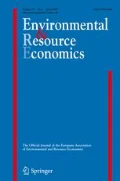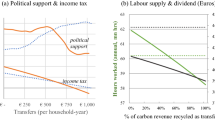Abstract
This paper presents a distributional argument for the use of supply-side climate policies whereby carbon emissions are controlled through (i) depletion quotas or (ii) permanent confiscation of a fraction of the in situ carbon stocks. The modeling considers intertemporal competitive equilibria in the Cobb-Douglas version of the Dasgupta-Heal-Solow-Stiglitz model of capital accumulation and costless resource extraction. It is shown how policies (i) and (ii) preserve the functional distribution of income between capital owners and resource owners, compared to the case where no climate policy is needed, while suggested demand-side policies do not. Such observations are of interest as avoiding functional redistribution may facilitate climate change negotiations. The paper discusses policy implications of the analysis outside the simplified setting of the stylized model.
Similar content being viewed by others
References
Aldy JE, Krupnick AJ, Newell RG, Parry IWH, Pizer WA (2010) Climate mitigation policy. J Econ Lit 48: 903–934
Allen MR, Frame DJ, Huntingford C, Jones CD, Lowe JA, Meinshausen M, Meinshausen N (2009) Warming caused by cumulative carbon emissions towards the trillionth tonne. Nature 458: 1163–1166
Arrow K, Dasgupta PS, Mäler K-G (2003) Evaluating projects and assessing sustainable development in imperfect economies. Environ Resour Econ 26: 647–685
Asheim GB, Buchholz W, Hartwick JM, Mitra T, Withagen C (2007) Constant savings rates and quasi-arithmetic population growth under exhaustible resource constraints. J Environ Econ Manag 53: 213–229
Asheim GB, Hartwick JM (2011) Anomalies in green national accounting. Ecol Econ 70: 2303–2307
Asheim GB, Wei T (2009) Sectoral income. Environ Resour Econ 42: 65–87
Bohm P (1993) Incomplete international cooperation to reduce CO2 emissions: alternative policies. J Environ Econ Manag 24: 258–271
Coase R (1972) Durability and monopoly. J Law Econ 15: 143–149
Dasgupta PS, Heal GM (1974) The optimal depletion of exhaustible resources. Rev Econ Stud 41:3–28
Dasgupta PS, Heal GM (1979) Economic theory and exhaustible resources. Cambridge University Press, Cambridge, UK
Eisenack K, Edenhofer O, Kalkuhl M (2012) Energy taxes, resource taxes and quantity rationing for climate protection. Energy Policy (forthcoming). doi:10.1016/j.enpol.2012.05.001
Gerlagh R (2011) Too much oil. CESifo Econ Stud 57: 79–102
Harstad B (2012a) Buy coal! A case for supply-side environmental policy. J Political Econ 120: 77–115
Harstad B (2012b) The market for conservation and other hostages. Working Paper no. 17409, NBER, Cambridge, MA
Hoel M (1994) Efficient climate policy in the presence of free riders. J Environ Econ Manag 27: 259–274
Hoel M (2012) Carbon taxes and the green paradox. In: Hahn RW, Ulph A (eds) Climate change and commonsense: essays in honour of Tom Schelling. Oxford University Press, Oxford
Liski M, Tahvonen O (2004) Can carbon tax eat OPECs rents. J Environ Econ Manag 47: 1–12
Méjean A, Hope C (2010) The effect of CO2 pricing on conventional and non-conventional oil supply and demand. Cambridge working paper in Economics 1054
Persson TA, Azar C, Johansson D, Lindgren K (2007) Major oil exporters may profit rather than lose, in a carbon-constrained world. Energy Policy 35: 6346–6353
Rosenthal E (2010) Nations that debate coal use export it to feed China’s need. New York Times, 21 Nov 2010. Available at http://www.nytimes.com/2010/11/22/science/earth/22fossil.html
Sefton J, Weale M (2006) The concept of income in a general equilibrium. Rev Econ Stud 73: 219–249
Sinn HW (2008) Public policies against global warming. Int Tax Public Financ 15: 360–394
Solow RM (1974) Intergenerational equity and exhaustible resources. Rev Econ Stud 41:29–45
Stiglitz J (1974) Growth with exhaustible natural resources: efficient and optimal growth paths. Rev Econ Stud 41:123–137
Tickell O (2008) Kyoto2: how to manage the global greenhouse. Zed Books, London
van der Ploeg F, Withagen C (2011) Is there really a green paradox? J Environ Econ Manag (forthcoming)
Weitzman ML (1976) On the welfare significance of national product in a dynamic economy. Q J Econ 90: 156–162
Author information
Authors and Affiliations
Corresponding author
Rights and permissions
About this article
Cite this article
Asheim, G.B. A Distributional Argument for Supply-Side Climate Policies. Environ Resource Econ 56, 239–254 (2013). https://doi.org/10.1007/s10640-012-9590-2
Accepted:
Published:
Issue Date:
DOI: https://doi.org/10.1007/s10640-012-9590-2
Keywords
- Climate change negotiations
- Supply-side climate policies
- Functional income distribution
- Non-renewable resources




